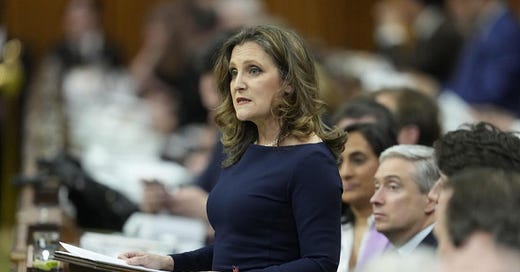How Freeland’s capital gains tax changes will harm Canada’s economic future
Team Trudeau seems to have forgotten all the reasons why they’d rejected changes to capital gains taxes for the last eight-plus years.
If you’re worried that my Star columns are going to be all politics and tech, my only defence is that the Liberal government keeps forcing my hand. After more than 20 years of committing capital to Entrepreneurs the world over, it seemed that someone who had actually risked capital for a living had to explain the inherent risks of Finance Minister Chrystia Freeland’s capital gains tax grab. Few folks on Parliament Hill have much direct experience in either the Innovation Economy, venture investing or the Capital Markets, and this budget proposal is a prime example of how Canadians pay for that shortcoming.
I’ve posted the first half below; if you want to see how it ends, you have the choice of buying the Wednesday hardcopy, signing up for the $65 (pre-tax rebate) annual digital subscription via the newspaper website, or accessing the piece via your Apple News App.
For all of the political bluster of “Making Sure Everyone Pays Their Fair Share,” successive Liberal Budgets had – until now – avoided toying with Canada’s capital gains tax rates.
For good reason.
Bill Morneau, Prime Minister Justin Trudeau’s first Finance Minister, recognized that making Canada less attractive to investors would be “negative to our long-term growth.” A former CEO himself, Morneau could weigh the economic risks against the political appeal of stoking faux class warfare. Chrystia Freeland, his replacement, resisted the temptation across three budgets – choosing instead to hit the Fat Cats with a “luxury tax” on fancy cars, boats, and private jets.
The political calculus on capital gains appears to have flipped last October when Freeland hired Andrew Bevan, a top aide to former Ontario Premier Kathleen Wynne. While Bevan may have pitched the PMO that boosting capital gains taxes would impact only the “ultra wealthy,” Team Trudeau seems to have forgotten all the reasons why they’d rejected the very same tax change for the last eight-plus years.
Several “economic justice activists” and a handful of purportedly “rich Canadians” support this retroactive tax grab, demonstrating their preference for Socialist “wealth redistribution” over high-value job creation. More instructive is the broad consensus among my fellow Entrepreneurs that Freeland’s changes will harm Canada’s economic future.
How so? Look no further than Shopify, a global leader in the software sector.
Founded in Ottawa in 2006, Shopify has created thousands of knowledge industry jobs. Since its initial public offering, company shares are up more than 2,500% - outperforming juggernauts such as Apple and Google. As with many Tech startups, stock options were broadly shared with Shopify’s early employees. The wealth those options generated has spawned over 100 new Angel investors; individuals who now have the investment capital to help commercialize the billions Canada invests each year in R&D.
A prime example is Backbone Angels, a collective of nine female Shopify employees who have already put their new financial might and mentoring skills behind 42 female-founded Start-ups.
Hit the link to read the rest.
MRM
(note: this post is an Opinion Piece)





So yes, they are taxed as employment income. So the changes to the capital gains rules wouldn’t impact them.
Aren’t stock options taxed as ordinary income?